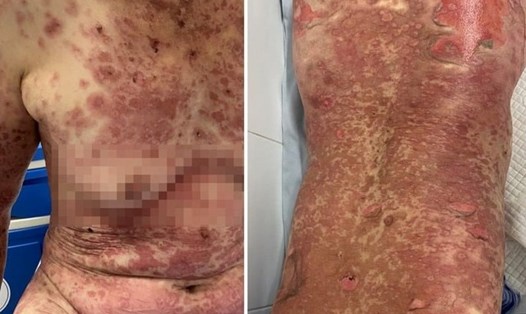Two days before being hospitalized, Mr. PQG, 78 years old in Hanoi, had symptoms of fever, fatigue, loss of appetite and loose stools.
The next day, erythema appeared on the body at a few points, but within just one day, the erythema spread throughout the body, accompanied by severe itching, fever, impaired consciousness and ulcers.
The patient begins to have high fever, impaired consciousness, dense red rash all over the body, and itching. The patient was taken to a medical facility by his family and was diagnosed with monitoring for anaphylaxis suspected to be due to drug allergy, monitoring for sepsis, liver failure and acute kidney failure.
Immediately afterwards, the patient was transferred to the Central Tropical Diseases Hospital. After nearly a month of treatment, the patient's health condition has gradually stabilized. Allergic nodules have decreased and the dangerous stage has passed.
The patient's family said that the patient had many underlying diseases, so he used many different medications every day.
Dr. Tran Thi Hai Ninh - Head of the Department of General Internal Medicine, Central Tropical Diseases Hospital - said: Through medical history, we learned that the patient has a very complicated medical history, including multiple organ failure. , stroke, hypertension and chronic gout. These underlying diseases increase the risk of side effects when using medication. The patient's case is a clear example of drug allergy to treat chronic diseases in elderly patients, especially those with many underlying diseases.
Dr. Tran Thi Hai Ninh recommends that patients should not arbitrarily use drugs, especially new drugs or drugs of unknown origin. For elderly people with many underlying diseases, regular examinations are essential for early detection and timely management of potential diseases. Thereby also helping doctors monitor the disease condition to adjust treatment therapy if necessary and prevent possible complications.








